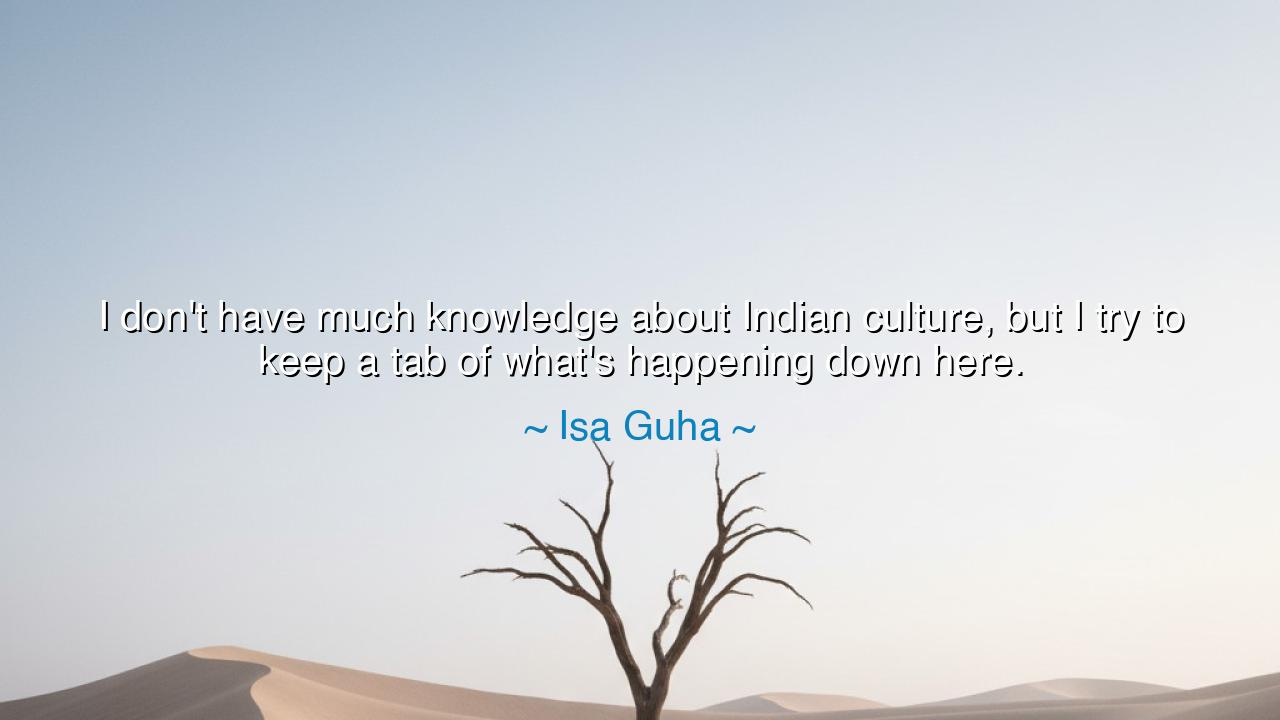
I don't have much knowledge about Indian culture, but I try to
I don't have much knowledge about Indian culture, but I try to keep a tab of what's happening down here.






In the humble and thoughtful words of Isa Guha, we hear the quiet voice of one who stands between worlds, speaking not with pride but with sincerity: “I don’t have much knowledge about Indian culture, but I try to keep a tab of what’s happening down here.” These words, though simple, carry the profound weight of identity — of a soul reaching toward its roots while living under another sky. They reflect the eternal yearning of those who dwell far from their ancestral lands, yet feel the invisible threads that bind them still. It is the voice of a daughter of two worlds, who honors both, yet humbly admits that belonging requires not inheritance alone, but awareness, curiosity, and the will to remember.
The origin of this quote rests in the life of Isa Guha, the celebrated cricketer and commentator, born in England to Indian parents. Her heritage is woven with the colors of Bengal, yet her upbringing unfolded in the English countryside. In speaking these words, she reveals not ignorance, but honesty — the acknowledgment that cultural knowledge is not a birthright, but a bridge we must build through intention. Her statement echoes the experience of countless children of the diaspora, who live between the land of their forebears and the land of their birth, learning to reconcile the two within the chambers of the heart.
To say, “I don’t have much knowledge,” is not a confession of weakness, but a gesture of humility — the beginning of wisdom. The ancients taught that the wisest man is he who admits how little he knows. So too, Isa’s words are an act of reverence toward a heritage she does not claim to master but seeks to understand. This is the first step of all seekers — the awareness of distance, the recognition that one’s cultural memory, like a flame left unattended, can fade unless tended with care. In her simple statement lies a truth that transcends borders: that identity is not preserved by inheritance alone, but by effort, by listening, by keeping a “tab” on the stories that shape one’s lineage.
Throughout history, there have been many who stood between two worlds and made of that tension a source of strength. The philosopher Marcus Aurelius, a Roman emperor and Stoic thinker, lived amid both the glory and corruption of his empire, yet sought to remain true to the inner virtues of simplicity and truth. He, too, “kept a tab” — not on nations or customs, but on his own soul, ensuring it remained aligned with the universal good. Likewise, the poet Rabindranath Tagore, though deeply rooted in Indian culture, drew inspiration from Western music and thought, blending both into a universal harmony. In them, as in Isa’s reflection, we see the art of balance — the ability to live in the present world without forgetting the one that gave you life.
When Isa Guha says she tries to “keep a tab of what’s happening down here,” she speaks not only of India, but of her own inner inheritance — of her desire to remain connected, to learn, to honor what flows through her veins. It is a statement of gentle responsibility. For to “keep a tab” is to remain awake to the stories of one’s people, to observe the evolving tapestry of their joys, struggles, and triumphs. In a world where roots are often severed by migration and time, such awareness becomes an act of devotion — a quiet, modern form of pilgrimage.
This quote also speaks to the universal experience of cultural duality — of living between languages, customs, and histories. To many who walk this path, there is a sense of loss, but also of possibility. For the one who belongs to two worlds can serve as a bridge between them. Like the banyan tree whose roots grow both above and below the earth, such a person draws nourishment from multiple sources, enriching both. Yet, as Isa reminds us, the strength of that bridge depends on curiosity — on the willingness to look back even as one moves forward, to learn without judgment, to love without boundaries.
Let this then be the lesson: whether you are of one culture or many, never cease to learn from the places and people that shaped you. Do not let distance dull your connection to your origins, nor let pride blind you to what you do not know. Keep a tab on your past — not to live in it, but to let it inform your present. Read the stories of your ancestors, taste their food, listen to their songs, and honor their values. And if you stand between worlds, do not mourn that in-between space — it is sacred ground, where understanding is born.
For as Isa Guha reminds us with grace, the act of remembering is itself an act of belonging. The path to knowledge is not a race to mastery, but a journey of reverence — of staying awake to who you are and where you came from. And in this awareness lies the truest kind of identity: not one claimed by birth, but one cultivated by heart, humility, and the endless desire to learn.






AAdministratorAdministrator
Welcome, honored guests. Please leave a comment, we will respond soon